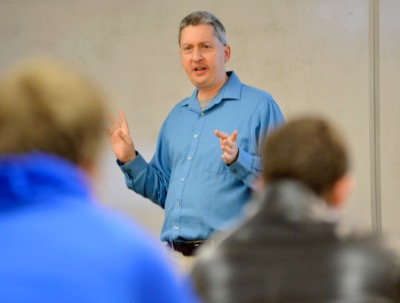Friday, November 16th, 2018
Rule change fallout feared
Official says lake effort collaboration may suffer
By William Kincaid
CELINA - A change in manure rules could undo years of progress and collaboration brokered by the Mercer County Soil and Water Conservation District and the Lake Improvement Association, an official said on Thursday morning.
Just before Labor Day weekend, the Ohio Department of Agriculture proposed lifting the ban in the Grand Lake Watershed on surface application of manure between Dec. 15 and March 15 each winter, much to the chagrin of SWCD and LIA officials, who have seen improved water quality from the ban.
Some officials fear conditions will turn for the worse if the ban is lifted. SWCD District Administrator Nicole Hawk at the board's Thursday morning meeting recalled a time years ago when the LIA and SWCD weren't exactly on the same page.
"When we came together it was to fight. It wasn't to move forward, and I think that removing these (ban) dates could lead to going backward with that mentality and I think that that's only going to hurt all of us rather than move forward," Hawk said. "And I think if we're spending time chasing our tails because people are frustrated we're not going to make progress."
LIA leadership recently reported that Dr. Steven Jacquemin has published data showing that the current rules, enacted in 2010, are helping in the fight to clean up Grand Lake. Jacquemin credits the distressed-watershed rules for a 20 percent drop in levels of microcystin - a type of liver toxin - between 2017 and 2018.
Hawk pointed to the adage of "if it ain't broke, don't fix it," asserting the proposed lifting of the manure ban has nothing to do with the Grand Lake Watershed and "everything to do with trying to declare the Western Lake Erie Basin as distressed."
"Because Senate Bill 1 that covers Western Lake Erie Basin essentially nullifies all of the guidelines that are in the distressed watershed rule, and so to have a distressed watershed in the Western Lake Erie Basin would look very different," she said.
The political maneuvering, she continued, aims "to make the distressed watershed rules match the Senate Bill 1 rules because one is law, one is rule."
"Ultimately Senate Bill 1 trumps the distressed watershed rules," Hawk said. "They were trying to bring it so that it's uniform."
Hawk said she would have gotten behind the idea of uniform rules had the proposal not tried to "relax the standards that we were already following."
"I thought it would go the other way," she said. "It doesn't make sense to take what we've done and move it backwards, and I'm afraid that that's what's going to happen."
SWCD officials, along with some from LIA and a group of producers, plan to voice their opposition to proposed manure ban lift at the next round of hearings on Tuesday in Reynoldsburg before interim director of agriculture Tim Derickson, who recently was named to replace Dave Daniels as head of the ODA. The LIA is organizing buses to take people to the event.
If no action is taken after testimony is heard, the final step in the process for the proposed changes will be before the Joint Committee on Agency Rule Review at the Ohio Statehouse on Dec. 10.
Hawk said staff will reiterate talking points laid out in an SWCD letter addressed to ODA in September.
"It is our experience that the winter manure application ban dates ensure manure does not lay on the surface of the fields too long which could lend itself to increase nutrient runoff over the winter months," Hawk wrote in the letter. "In order to minimize confusion locally and to maintain strong relationships with our producers and stakeholders, the winter manure application and dates … should not be removed."
However, SWCD would back exemptions to the winter manure application band period.
"(Because) there are times during the ban date period which are optimal for manure application, we propose a modification to the current Distressed Watershed rules for exemptions within the winter manure application period if manure is directly injected or manure is surface applied and incorporated with full width tillage within twelve hours of the application," Hawk wrote.
Hawk also asked that board member Andy Schwieterman provide testimony next week since he's a livestock farmer in the watershed, with the proposed rule changes to directly impact his operation.

